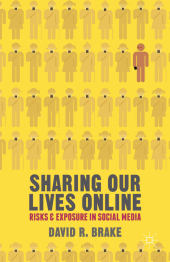 Neuerscheinungen 2014Stand: 2020-02-01 |
Schnellsuche
ISBN/Stichwort/Autor
|
Herderstraße 10
10625 Berlin
Tel.: 030 315 714 16
Fax 030 315 714 14
info@buchspektrum.de |

David R. Brake
Sharing our Lives Online
Risks and Exposure in Social Media
2014. viii, 193 S. 216 mm
Verlag/Jahr: SPRINGER PALGRAVE MACMILLAN 2014
ISBN: 0-230-32036-8 (0230320368)
Neue ISBN: 978-0-230-32036-9 (9780230320369)
Preis und Lieferzeit: Bitte klicken
Why do we share so much about our lives on social media when we often have little idea who might be reading or viewing? David R. Brake examines the causes and consequences of moving towards a radically open society.
Table of Contents 1. Introduction 2. What is Risky and Who is at Risk? 3. How and Why Social Media Interaction is Different 4. Imagining the Reader 5. Time and Memory in Social Media 6. Towards a Radically Open Society 7. Conclusion Bibliography
"Sharing our lives online: Risks and exposure in social media, by David R. Brake is a comprehensive research-based book, dealing with the risks of sharing and revealing personal information online. ... David R. Brake has extracted this book out of his doctoral dissertation, which makes it an interesting example for postdoctoral researchers to publish their research." (Marziyeh Ebrahimi, Information, Communication & Society, Vol. 21 (12), 2018)
´In the age of social media sharing, David R. Brake presents a nuanced, evidence-based, and highly readable account of the dangers of exposing our lives online, grounded in understandable scientific and scholarly theory. Steering between uncritical enthusiasm at one pole and moral panic at the other - extremes that have characterized much of the public discourse about the effects of social media - Brake shows exactly how, and in what circumstances, sharing aspects of our personal lives online can be risky. Sharing our Lives Online also offers sound advice to individuals and parents who need to know what to do themselves to take advantage of social media without running into the pitfalls of oversharing, and need to know how to talk to their children about risks and cautions.´ - Howard Rheingold
´[Sharing our Lives Online] provides a compelling account of the risks of online communication and the ways in which technologies are constructed to lead us to disclose more than we may think. [His research is] delicately woven into a rich discussion of the economic, technical and social factors that encourage self-disclosure [and features] a fascinating glimpse into blogging practice over time... An engaging and illuminating book.´ Times Higher Education
´Sharing Our Lives Online is an interesting resource for students and scholars in the fields of digital media and interpersonal communication but also for a non-academic audience interested in the risks of online self-exposure. Not only does it successfully combine theoretical discussion and empirical examination; it also draws upon specific case studies that make the reading particularly accessible.´ - LSE Review of Books, 2014


